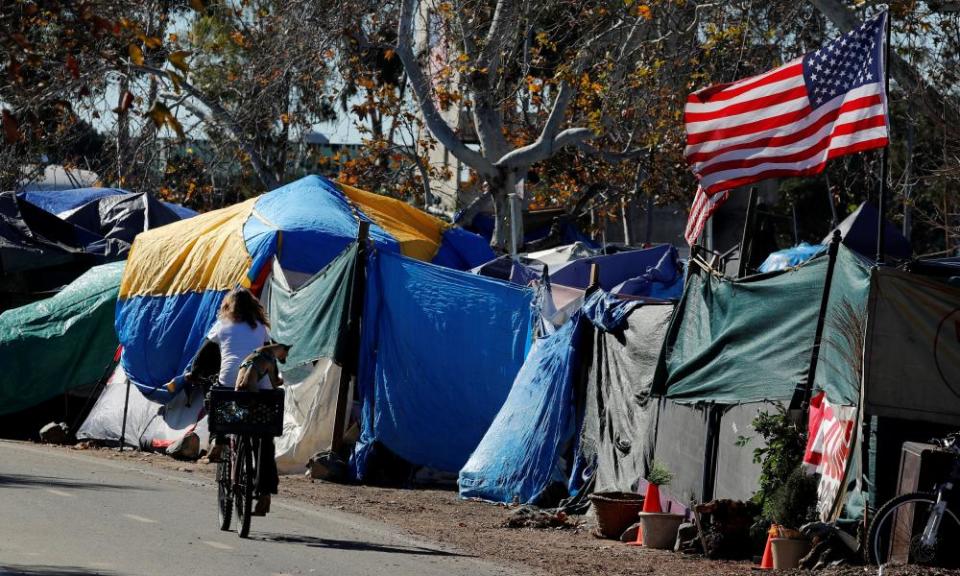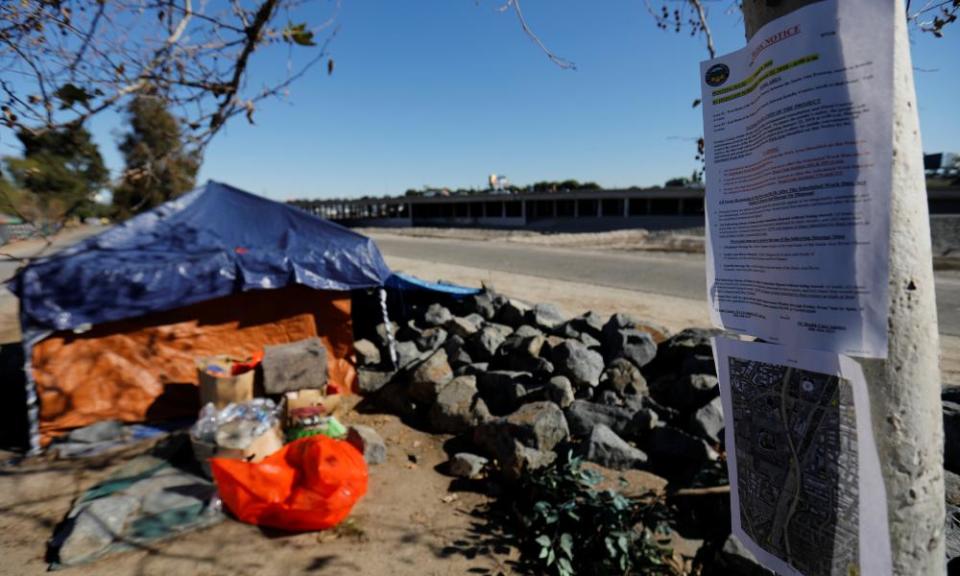California county evicts hundreds from homeless camp – with few beds to offer
Orange County, one of the state’s wealthiest, has targeted as many as 1,000 people near Disneyland, despite having just 250 shelter spaces

One of the richest counties in California has started evicting hundreds of its poorest residents from a dusty riverbed homeless encampment just a few miles from Disneyland. Activists say the site may be home to as many as 1,000 people.
Yet Orange County has admitted that it has just 250 shelter beds currently available.
Asked how the county would deal with the fact that there would be more evicted residents than shelter beds, a spokeswoman, Jennifer Nentwig, said only that county officials would “monitor” the number of shelter beds available, and that “the county is not dictating where people are able to go”.
“That is the comment that I’m able to provide,” she said.
The county’s move is drawing international condemnation. The UN special rapporteur on adequate housing, Leilani Farha, who is on an unofficial visit to homeless encampments in California and is traveling to Los Angeles this week, said the county should halt the riverbed sweeps.
“My suggestion is a moratorium on forced evictions,” she said. “Forcibly evicting people without any alternative housing options for the bulk of them is hugely problematic and not consistent with a human rights approach. It’s about treating people like human beings.”
As in the rest of the US, there are far more homeless people than affordable-housing units. According to last year’s homeless count, Orange County has just under 5,000 residents who are homeless and a meager affordable-housing pipeline.

County officials believe there are about 450 people living in the riverbed encampment, while the ACLU gives a much higher number. The camp has been steadily growing in recent months, despite little to no access to plumbing or clean water. A local activist’s attempt to install portable toilets in the encampment was blocked by county and then city officials, who worried amenities in the riverbed might further entrench the settlement. Housed residents in the area have complained of unsanitary conditions in the riverbed and accused its homeless residents of theft and breaking into cars.
Early this morning, a small crew of county workers picked apart a large pile of clothing mixed with debris, packing items into orange trash bags and hauling them into a truck. Residents stood outside swapping rumors about what was happening and how soon they would have to leave.
Ricardo Montiel and his girlfriend, who has schizophrenia, have been living in the riverbed encampment for the last few months. They have been homeless for about six years, he said, and used to sleep on the streets of different cities in the county, where he was raised.
“It was a nightmare with the police,” he said. “They always wanted to kick us out of their city, to go to another city. They drove me and my [girlfriend] out of my city to another city one day, just so we wouldn’t be homeless in their city.”
When the pair arrived at the riverbed encampment, it was like a refuge, he said.
“It’s a place to call home now. I’m not homeless – I consider this a home. I have somewhere to go every night, instead of being in danger out there on the streets.”
“Yeah, there’s violence. Yeah, there’s drug use,” said Michael, another resident. “You have that in every city. The only difference is this city is on a riverbed.”
Along with the shortage of shelter space and permanent housing, most cities in the county have laws that prohibit sleeping outside, which means a night on the streets can turn into a citation or even jail time.
“This has been the county’s de facto solution to homelessness – to allow cities to push people out of city centers and to remote places,” said a local ACLU policy analyst, Eve Garrow.
“The problem is the encampment gets very large and visible and starts attracting attention, and then the county moves in [to] push people out someplace else.”
Do you have an experience of homelessness to share with the Guardian? Get in touch

